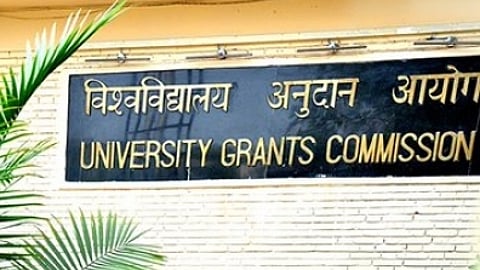

NEW DELHI: The University Grants Commission (UGC) on Monday released draft guidelines for the recruitment of Vice Chancellors at universities, allowing the direct appointment of industry experts, as well as senior professionals from the public sector.
The current guidelines allow for academicians with at least 10 years of experience as a professor or in a prominent research or academic administrative role to be eligible for the post of V-C. However, the new norms propose that individuals with at least 10 years of senior-level experience in industry, public administration, public policy, or even in PSUs can also be considered for the role.
The draft guidelines, released on Monday by Union Education Minister Dharmendra Pradhan, also seek to amend the norms for hiring faculty at universities. According to the draft, individuals can qualify for faculty positions based on their performance in a subject of their choice in the UGC-NET, even if their undergraduate and postgraduate degrees are in different disciplines.
Speaking with this paper, UGC Chairman Prof. Mamidala Jagadesh Kumar said, "This is an important flexibility to remove rigid subject boundaries and allow faculty applicants to transition across disciplines, creating a more multidisciplinary ecosystem within university campuses, as envisaged in NEP 2020."
“The 2025 UGC regulations aim to transform how faculty members are recruited and promoted in Indian HEIs by introducing changes that enhance flexibility, inclusivity, and excellence in faculty recruitment and career progression,” he added.
The new guidelines, posted on the UGC website for stakeholder comments, will amend the norms for hiring faculty members in universities. They will allow individuals with a postgraduate degree in Master of Engineering (M.E.) or Master of Technology (MTech), with at least 55 percent marks, to be directly recruited to the Assistant Professor level without having to qualify for the UGC NET.
The draft norms will also permit candidates to teach based on their highest academic specialization. For example, a candidate with a Ph.D. in chemistry, despite holding a bachelor’s in mathematics and a master’s in physics, would now qualify to teach chemistry.
"These regulations also facilitate the selection of faculty members from multidisciplinary backgrounds. The primary objective of these regulations is to broaden the horizon and provide freedom and flexibility so that faculty members can excel in areas they are passionate about. The revised regulations ensure that contributions to knowledge and the community, rather than rigid qualifications, are valued," UGC Chairman Kumar said.
Kumar also mentioned that the new regulations change the "selection process for vice-chancellors," such as expanding eligibility criteria to include professionals from academia, research institutions, public policy, public administration, and industry. These regulations also provide clear guidelines on the composition of the VC's search-cum-selection committee, tenure, age limits, eligibility for reappointment, and who can form the search-cum-selection committee.
The new guidelines come several months after economist Ajit Ranade was removed from his position as Vice Chancellor of the Pune-based Gokhale Institute of Politics and Economics (GIPE). His removal was due to the lack of the required ten years of teaching and academic research experience, despite his extensive expertise in his field. However, Ranade was reinstated to the post by the Bombay High Court, though he voluntarily resigned in November.
Union Education Minister Dharmendra Pradhan, while releasing the draft, said, "By promoting flexibility, inclusivity, and recognizing diverse talents, we are paving the way for a dynamic academic future for India," emphasizing the timely nature of these reforms in light of the ongoing implementation of NEP 2020.
The draft also extends the scope of qualifications by introducing provisions that recognize professional achievements, such as innovative teaching methods, digital content creation, and contributions to research funding.
The new guidelines have also done away with the Academic Performance Indicator (API) system, which was used for promotions of faculty members.
"The 2025 regulations move away from the API-based shortlisting used in previous guidelines, focusing instead on a more holistic, qualitative assessment. Selection committees will now evaluate candidates based on their broader academic impact, including innovation in teaching, technology development, entrepreneurship, book writing, digital learning resources, community and societal contributions, promotion of Indian languages and knowledge systems, sustainability practices, and the supervision of internships, projects, or successful startups," Kumar said.
The norms for promotion to the associate professor level have been revised for disciplines such as Arts, Commerce, Humanities, Education, Law, Social Sciences, Sciences, Languages, Library Science, Physical Education, Journalism and Mass Communication, Engineering/Technology, Management, Drama, Yoga, Music, Performing Arts, Visual Arts, and other traditional Indian art forms like Sculpture.
The revised guidelines also introduce changes to the composition of the selection committee for the Vice Chancellor role, now making it a three-member panel. This panel will consist of nominees from the Visitor or Chancellor, the UGC, and the university's apex body. Earlier, it was a three- to five-member panel.
The guidelines also outlined several criteria for consideration by the selection committee when recruiting and promoting university and college teachers. These include innovative contributions to teaching, development of research or teaching labs, securing consultancy or sponsored research funding as a Principal Investigator or Co-Principal Investigator, and making teaching contributions in Indian languages.
Now, candidates with a minimum of eight research publications in peer-reviewed journals, eight book chapters, or a book as an author, or two books as a co-author by a reputed publisher, or eight granted patents are eligible.
The draft regulations also encourage the use of Indian languages in academic publications and degree programs.
The new regulations will apply to central, state, private, and deemed universities.